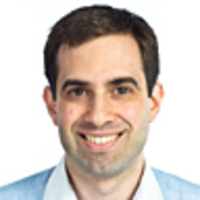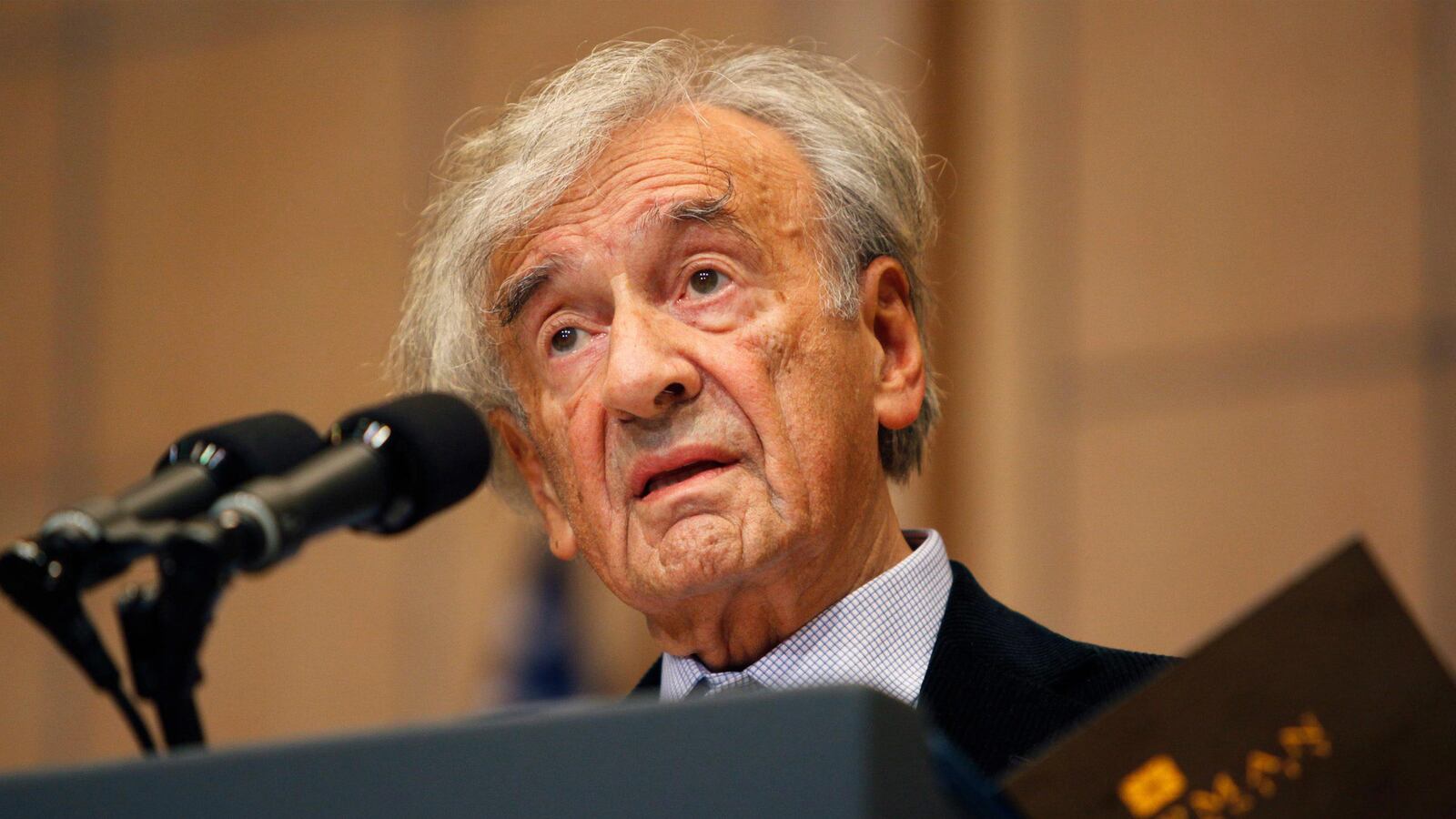**Editor's Note: On Saturday July 2, Elie Wiesel passed away at the age of 87.**
In the introduction to the newest translation of Night, the memoir that made Elie Wiesel famous and led to his 1986 Nobel Peace Prize, the Holocaust survivor poses a quandary. “Sometimes I am asked if I know ‘the response to Auschwitz’; I answer that not only do I not know it, but that I don’t even know if a tragedy of this magnitude has a response.” It is clear, however, that writing, for Wiesel, is the best response—a way to ensure that what happened is not forgotten, because, as he puts it, “to forget the dead would be akin to killing them a second time.” The themes of memory, survival, the Holocaust, and above all else, the sanctity and luminousness of a single human life, are alive in Wiesel’s latest novel, Hostage, which has just been translated from the French by Catherine Temerson. The year is 1975, and a Brooklyn resident named Shaltiel Feigenberg, books in hand, is suddenly plucked off the street by two fundamentalists, an Italian and an Arab, who demand that three Palestinian prisoners be released in exchange for his freedom. Shaltiel, who is described as “a discreet man with no status or fortune,” is a storyteller whom the terrorists mistakenly think is more important than he actually is. Wiesel, who is originally from Sighet, Romania, is now 83 years old, but he has never turned away from his memory of trauma, and his novel reminds us that the emotional legacy of the Holocaust is still very much with us.
Shaltiel is the son of a Holocaust survivor. I’m wondering, as the generation that lived through the Holocaust passes on, and there are fewer people who can bear witness in a first-person way to what happened, if you have thoughts about how the Holocaust should be remembered as that happens?
You can imagine I have. I’ve given my life to the principle and the ideal of memory, and remembrance. I know that my generation of course is a kind of endangered species. We are less and less. But on the other hand … I think the children will be our successors. Not only that, I’m a teacher, I speak [to] my students, I do believe [that] to listen to a witness is to become a witness in turn. So, look, my generation has become a witness, has been a witness, and now the question of course is—very often I think about [this]—one day the last survivor will be gone. I don’t want to be that one. Because the idea to be the last, with all the memories, and all the spoken and unspoken ideas, and words, I don’t want to be that one.
Do you feel there’s any obligation on the younger generation’s part to keep the memory alive?
I would call it privilege. It’s the young generation’s privilege to be able to say, “Don’t worry, we shall be here, to speak about you and for you.”
What’s the importance of speech, or storytelling, to you, in the book, or both?
I come from a region, and from a land, and from a time when stories dominated our lives … when I was very, very small, the Biblical stories, the Talmudic stories, and later on the mystical stories. The Bible is not only laws, it’s also stories. It begins, “In the beginning God created Heaven.” If I had written these words, I wouldn’t have written anything else, it’s just enough. “In the beginning God created Heaven and earth.” It’s the beginning of a story. Who can do that today, really—to write such words? I have tremendous, tremendous love for stories.

Could you tell me something about the importance of faith to you, and a belief in God, and if that’s changed over the years for you—or has it evolved?
Of course it evolves. One always goes back to one’s childhood in the beginning, and I come from a very religious family and surrounding. Very religious. I cannot say that I am now as religious, or ever after the war. Although after the war I was in Paris, in a children’s home, and for a while it was a small group who tried to become even more religious than before. They wanted to show the enemy, “Look, you did not succeed in that, to destroy our faith.” I was very, very religious. And of course I wrote about it in Night. I questioned God’s silence. So I questioned. I don’t have an answer for that. Does it mean that I stopped having faith? No. I have faith, but I question it.
And that’s the way you feel today—to have faith but to question it?
Absolutely. One has the right, and sometimes the duty, to question it. … You cannot conceive of the tragedy with or without God. That is a problem. It is too easy to say God wasn’t there, really … But on the other hand, Auschwitz did not come down from heaven readymade. [It was] manmade. Human beings had the idea, the horrible idea … Human beings created the flames, did the flames. So many children were burned, and some of them alive. Human beings … God could say, “Hey, all right, ask me where I was.” Where were you? Where was the world?
I’m wondering if you feel like the world is a vastly different place in the sense that the world has learned its lesson [since the Holocaust]? Do you have feelings about current events and the politics of intervention and global conflict?
I was invited a few years ago to address the General Assembly, and I gave the title for my talk, “Will the World Ever Learn?” And I gave a very pessimist answer: no. It will not. Because it hasn’t. It hasn’t and otherwise there would be no Rwanda, and no Syria today, and children in the hundreds and thousands would not die of hunger and so forth; that means they have not learned enough. But some lessons have been drawn after all. … We have learned certain things, but generally speaking I think the world has not learned enough. A few weeks ago, I traveled and went to the museum of the Holocaust in Washington, and in my words of introduction, [I said] … what about Syria, for instance, today? In this place I am asking you this question. Here. You know very well that the worst that people have done to each other could have been prevented. It could have been, that is part of the tragedy. It could have been, had the world simply stopped evil in the beginning. Here you have Syria, people die every single day I think, how many people die every day? … For 14 months, day after day, people die, and kill each other in Syria and we say nothing.
The [Holocaust Memorial Museum] was inaugurated, it was April, 1993, and President Clinton and I spoke there, and then again I remember I was working on my speech all night. I was finishing in the hotel. It was 36 presidents, foreign presidents, and our own, and I felt it had to be a good speech. I worked on it very hard. And then it was raining that day. Rain, rain. And I was called to the lectern. I opened my folder … and really, I almost had a heart attack. It was soaked. Soaked! And I had to make a quick decision. Either to try to remember—it would have been a tragedy and a disaster—or to invent a new one. So I improvised a new one. And in the middle I turned to the president, and I said, “Look, I just came back from Sarajevo,” and I kept telling him what I have seen there, and I said, “You must do something, Mr. President.” He waited for me outside, he and Hillary and Chelsea, and he said, “Look, you challenged me. I’ll do it. But you must help me.”
This interview has been condensed and edited.





